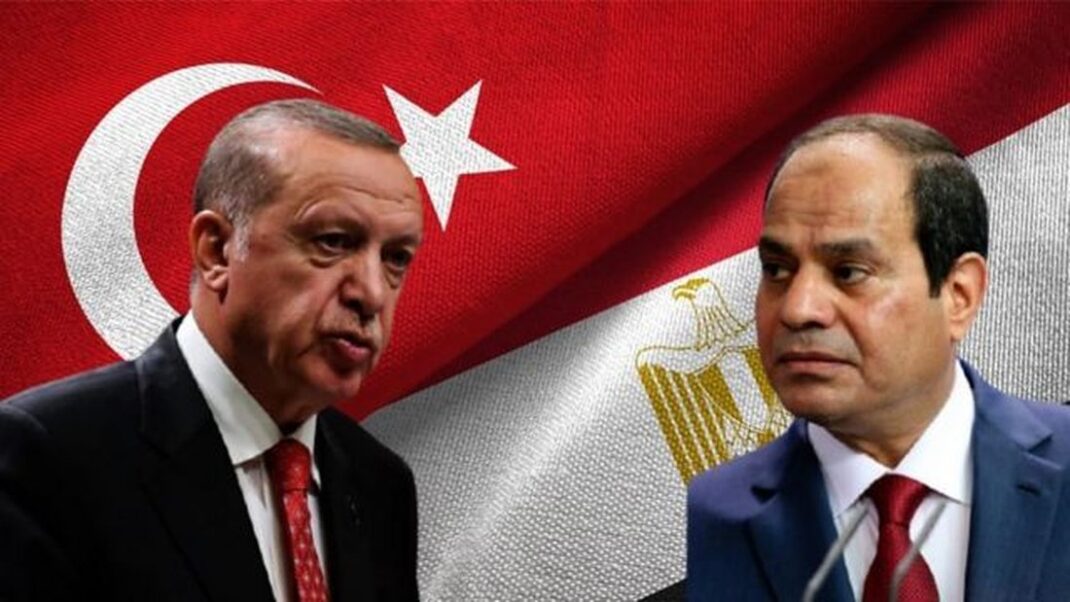Prof. Miral Sabry AlAshry

Turkey has renewed its relations with the Middle East, with a focus on achieving political stability in Libya and resolving issues through dialogue among all parties. This commitment was demonstrated through discussions held between Turkish Foreign Minister Hakan Fidan and Libyan Prime Minister Abdul Hamid Dabaiba in Tripoli.
The talks covered various important topics related to bilateral relations and cooperation on regional issues. The discussions also addressed current areas of cooperation and potential collaboration on regional conflicts, security issues, and instability in certain parts of Africa. Turkey and Libya emphasized their joint efforts in combating terrorism, human smuggling, and illegal immigration. They also discussed the resumption of Turkish Airlines flights to Libya, highlighting the need to restore these flights as soon as possible.
Fidan emphasized Turkey’s support for Libya and its commitment to preventing further conflict in the country. Turkey rejects the division between East and West and believes that dialogue is essential for resolving issues with the approval of all parties. As a result of the improving relations with eastern Libya, Turkey has decided to reopen its consulate in Benghazi.
Since the beginning of 2022, Turkey has been gradually moving towards reconciliation with eastern Libya. This has included the announcement of plans to reopen the Turkish consulate in Benghazi. Turkey is also actively engaging with Egypt and the United Arab Emirates to play a constructive role in resolving the Libyan crisis.
In 2023, the Turkish ambassador visited Benghazi and the Speaker of the Libyan House of Representatives, Aguila Saleh, visited Turkey twice. During the meetings, President Erdogan expressed Turkey’s support for expediting a consensual solution to the Libyan crisis and holding presidential and parliamentary elections as soon as possible.
The decision by the Turkish Parliament to extend the army’s mission in Libya reflects Turkey’s significant involvement in supporting the Government of National Accord (GNA) led by Fayez al-Sarraj. Turkey has sent thousands of forces and mercenaries from armed factions in Syria to western Libya, demonstrating its commitment to strengthening the GNA’s position in the ongoing conflict.
The memorandum of understanding for military and security cooperation, signed by President Recep Tayyip Erdogan and Fayez al-Sarraj in Istanbul on November 27, 2019, marked a significant milestone in Turkey’s engagement in Libya. This agreement paved the way for increased Turkish military support, including the deployment of troops and provision of military equipment to the GNA.
The extension of the army’s mission in Libya for two years, starting on January 2 of last year, demonstrates Turkey’s long-term commitment to its military intervention in the country. This decision has implications for the conflict dynamics and the broader geopolitical landscape in the region, solidifying Turkey’s role as a key player in the Libyan crisis.
According to a memorandum between Al-Sarraj and Erdogan, Turkey has taken control of the Al-Watiya air base and the Misrata naval base, and has established a center for the Turkish-Libyan joint command in Tripoli. Despite the ceasefire agreement implemented on October 24, 2020, and conferences held in Berlin, France, and Moscow, which called for the withdrawal of all foreign forces and mercenaries from Libya within 90 days, Turkey has continued to train Libyan forces inside the country and build camps in Turkey. This goes against the agreement and conferences, and it appears that Turkey is using this as a way to boost its economy. They have been providing military training, aid, cooperation, and advisory activities to the Libyans, with over 15,000 Libyan personnel trained and health support given to about 37,000 people.
Turkish President Recep Tayyip Erdogan is set to visit Egypt next week, marking his first visit in 10 years. Relations between Cairo and Ankara have been tense since the overthrow of former President Mohamed Morsi in 2013. Erdogan had previously supported The Brotherhood in the Middle East region but has since changed his stance. The interests of Turkey and Egypt require good relations between the two countries, and Erdogan is seeking reconciliation with the administration of Field Marshal Haftar in Benghazi, Libya. The Libyan file will be discussed during his upcoming visit.
On August 3, 2023, Egypt’s Minister of Trade and Industry, Ahmed Samir, and Turkish Minister of Industry and Technology, Mehmet Fatih Kacır, discussed opportunities for strengthening bilateral industrial cooperation during Samir’s visit to Ankara. They explored potential joint ventures, technical cooperation, and investment opportunities in industries such as automotive, furniture, and renewable energy. Both ministers emphasized the importance of developing a joint industrial cooperation plan and agreed to establish a working group to enhance coordination. They also discussed the possibility of reopening the Ro-Ro line between Egypt and Turkey to facilitate trade. Kacır expressed Turkey’s keen interest in enhancing cooperation with Egypt and welcomed the proposal for collaboration.
In conclusion, Egypt and Libya are expected to experience developments shortly with Turkey, including the reopening of files and cooperation that did not exist before.
***
Prof. Miral Sabry AlAshry is Co-lead for the Middle East and North Africa (MENA) at the Centre for Freedom of the Media, the Department of Journalism Studies at the University of Sheffield.
_____________________





